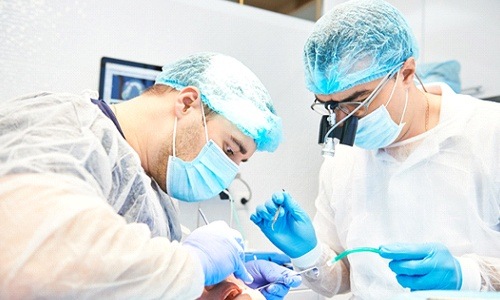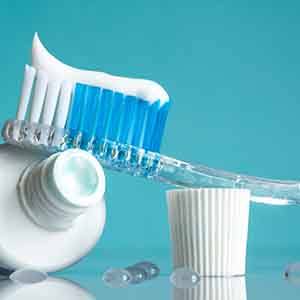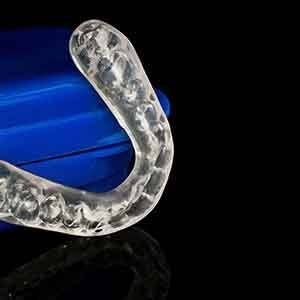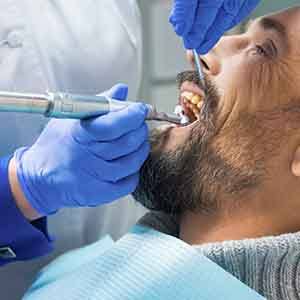Dental Implants – Tysons, VA
A Permanent Solution to Tooth Loss

If you’ve been living with any number of missing teeth, then you know that it can make life a lot harder. Thankfully, the interruptions you’ve endured in your normal routines can now be overcome with the placement of dental implants. When you visit us, we’ll guide you through every step of the process to ensure you’re left with a safe, effective and attractive solution for your tooth loss. To turn your life around in a positive manner, contact us today to schedule a visit with Dr. Naini!
Why Visit Aesthetic Dental Spa for Dental Implants?
- Implants Restored & Placed In-Office
- Additional Financing Available
- Enjoy Our Menu of Comfort Amenities
What are Dental Implants?

Dental implants are small titanium posts that resemble screws. Their biocompatible nature allows them to naturally fuse with the jawbone when placed in it through a process called osseointegration. As a result, the implants are able to restore the root structures of missing teeth, providing a strong support system for any type of restoration to be attached to.
The 4 Step Dental Implant Process

While we know you are eager to start enjoying all the benefits of your restored smile, unlike getting dentures and dental bridges, your new dental implants require a multi-step process that spans several months. Though this may seem like a long time, the benefits of this treatment are well worth the wait.
At our office, we’re proud to complete the entire dental implant process right here in our office instead of referring you out to a specialist. Dr. Naini has extensive experience with dental surgery and rebuilding smiles with dental implants.
While each patient’s treatment is as unique as their smile, there are four main steps you can expect from your dental implant journey: consultation, surgery, osseointegration, and the delivery of your final restoration.
Initial Dental Implant Consultation

At your consultation, Dr. Naini will review your oral health and medical history to ensure that you are a good candidate for dental implants. If necessary, she will work with you to complete any preliminary procedures such as gum disease therapy, tooth extractions, or bone grafting. Once your mouth is in good condition, we can move on to planning the rest of your treatment.
Dr. Naini and the rest of our team will walk you through what you can expect step-by-step, including the timeline for completion and your total cost.
Dental Implant Surgery

Dr. Alex M. Naini is proud to place her patients’ dental implants herself, right here in the office. This means you won’t need to travel from practice to practice for care, and we can handle all your financial details without you needing to pay multiple providers or file multiple claims.
During your dental implant surgery, Dr. Naini’s first step is always to numb your mouth. Once you’re numb, she will then place an incision in your gums. Next, she will insert the implant posts in your jawbone, close the gums, and place a protective cap over the implant posts. Once this is complete, you can return home to follow your after-care instructions.
Dental Implant Osseointegration & Abutment Placement

Osseointegration is the name for the process of your implant post fusing to your jawbone. This is an essential step, as your implant cannot support a crown (tooth) if it does not properly heal and fuse. The osseointegration process can take between three and six months, but it will depend on how well you follow your aftercare instructions and many other factors, including your individual health.
Once your jawbone has healed, you will need a second surgery. This is a much smaller scale procedure, but Dr. Naini will need to place the abutments on your implants that will eventually hold your crowns. As you recover from this stage, your final restoration will be crafted from the impressions Dr. Naini took from your mouth earlier in your journey.
Delivery of Dental Implant Restorations

Finally, you’ll return to have your restorations placed. These could include a bridge, denture, or individual crowns, depending on how many teeth you are replacing. At this stage, Dr. Naini will check to make sure that your bite is comfortable, and you’ll be ready to enjoy your newly restored smile!
Benefits of Dental Implants

Many experts consider dental implants the ideal way to replace missing teeth because of their unique placement in the jawbone. Unlike dentures and dental bridges, they can function as sturdy, stand-alone structures with several unique advantages.
Continue reading to learn more about the different benefits of getting dental implants, and feel free to contact us for additional information!
Day-to-Day Benefits

Tooth loss can detract from your daily quality of life because tasks that were once second nature, like eating and speaking, suddenly become much more challenging. Dental implants can help by:
- Restoring chewing power. These teeth can return an estimated 80 to 90 percent of your natural bite force, allowing you to enjoy more of your favorite foods.
- Enhancing enunciation. Gaps in your grin can lead to a lisp, slur, or other changes in your speech patterns that can thankfully be overcome with your new teeth in place.
- Boosting self-esteem. Replacing your lost tooth with a lifelike implant enhances your appearance so you look and feel like the healthiest, most confident version of yourself.
Health Benefits

There are other advantages of getting dental implants that might be less immediately noticeable but are just as (if not more) significant. For instance, did you know they can protect both your oral and overall health? They can improve your well-being in the following ways:
- Preserve your jawbone. Your jaw starts thinning when teeth fall out without roots in place to stimulate new bone growth with each bite down. Thankfully, the titanium rod of your implant fulfills this function to keep your jaw active and healthy.
- Prevent dental drifting. Your remaining teeth are likely to shift out of alignment to fill in the empty spaces left behind, which can wear them down unevenly or prematurely, increasing your vulnerability to decay and injuries. Your implant helps ensure everything remains in its rightful place.
- Improved oral hygiene. Maintaining your implants is as easy as brushing and flossing twice daily, and visiting our team every six months for a routine checkup and cleaning.
- Better diet. Many wholesome foods, like raw fruits and veggies, are hard to bite into and chew sufficiently without a complete set of teeth. Your restoration fuses with your jawbone, so you can enjoy many healthy ingredients to support your health without worrying it will become dislodged.
Long-Term Benefits

Implants are also usually more resilient than alternatives like dentures and dental implants so that you can enjoy the following benefits over the long term:
- They can last 25 or more years depending on how well you care for them.
- They also have an incredibly high success rate of more than 90%, meaning you’re not likely to experience failure.
- Save on expenses. Though they may cost more up front, they’re less likely to become dislodged or damaged than dentures and bridges, so they require fewer repairs or replacements. Plus, there’s no need to purchase adhesives or other accessories like with other restorations, so you spend less money over time.
Who Can Dental Implants Help?

A key trait of the dental implant process that distinguishes it from other tooth replacement methods is that it can accommodate any number of missing teeth. The type of replacement option we recommend for you will depend greatly on the number of teeth you have missing.
Missing One Tooth

We have two options for single tooth replacement: a fixed bridge and a single tooth dental implant. A fixed bridge is a prosthetic that restores the visible portion of your tooth. It’s held in place by a dental crown on either side, which are mounted on top of your natural teeth surrounding the gap.
The other option is a single tooth dental implant. This is a titanium post that is surgically placed in the jawbone to act as a natural tooth root. Titanium is biocompatible, allowing the implant to fuse to your jaw, becoming a sturdy support for your restoration. After, a crown is mounted on top to seamlessly complete your smile and replace your tooth from the roots up.
Missing Multiple Teeth

If you’ve lost two teeth in a row, a fixed bridge can close the gap. We take an impression of your mouth to recreate the teeth you’ve lost from all-ceramic material. The bridge is held in place by reshaping the adjacent teeth to bond dental crowns over them. You can restore your smile after just a couple of appointments, but you’ll need to permanently alter healthy teeth.
As an alternative to crowns, you can hold your bridge in place with a dental implant. A titanium post is surgically placed into your jaw to act as a tooth root while securing your bridge. It doesn’t rely on other teeth for support to preserve your natural smile.
Missing All Teeth

Whereas traditional dentures used to be the only option for replacing a full set of missing teeth, patients now have a better alternative. When you visit our office, Dr. Naini can custom design a set of implant-retained dentures that are permanently placed to restore your normal function and to allow you to perform your usual oral hygiene routine.
Different Types of Dental Implants

Depending on your unique oral anatomy as well as other factors, like your jawbone density, there are several different types of dental implant treatments. These include root form implants, plate form implants, and subperiosteal implants.
Root Form Implant

This is the most common type of implant. It’s looks similar to a screw and shaped like the root of a tooth. It’s set directly into the jawbone under the gums. Implanting a root form implant is a surgical process which requires local anesthesia. It takes about three to six months for your gums to heal from this process. After healing, the implant is uncovered and a replacement tooth can be attached.
A root form implant – also called an endosteal implant – is used when there is plenty of width and depth of the jawbone. If there is jawbone deterioration (i.e., if your jawbone is too narrow or short), a root form implant is usually not the best choice.
Plate Form Implant

A plate form implant is used when the jawbone is too narrow or short for a root form implant. The plate form implant is a flat, long implant which is set directly on top of the jawbone and under the gums. Bone and tissue will eventually grow around this type of implant, making it more secure. This type of implant is also called an endosteal implant.
The surgical process involving the implantation of a plate form implant is similar to that of the root form implant. Under local anesthesia, an incision is made into the gums, and the plate form implant is set on the jawbone. It takes about three to six months for your gums to heal, and after that, an abutment is attached to the implant. The replacement tooth, teeth, or crowns (depending on your needs) is then attached to this abutment.
Some plate form implants, however, do not require the long healing process and are immediately ready for restoration. Each individual is different – only a qualified restorative dentist can tell you which type of implant is right for you.
Subperiosteal Implants

A subperiosteal implant is used when there is not enough bone width or height for either root or plate form implants. If there is not enough jawbone, a custom-made implant must be created. This custom-made implant acts as an artificial jawbone, attaching to your natural jawbone and enhancing its surface area. Like the plate form implant, the subperiosteal implant rests on top of your jawbone and under your gums.
However, unlike the plate form implant, the subperiosteal implant first requires that an impression is made of the area of your jawbone where the implant is going to be placed.
There are two methods to obtain this impression. The first method is a surgical procedure and requires anesthesia. Your restorative dentist will make an incision into your gums and take an impression of your exposed jawbone. The impression is sent to a dental laboratory, and a custom-made implant is created.
About two weeks later, this custom-made implant is placed in your jawbone in a second surgical procedure, which is similar to the one used to place both root and plate form implants. After your gums have healed, replacement teeth are then installed onto this custom-made implant.
The second method of subperiosteal implant placement does not require surgery to create the impression of your jawbone. Rather, a CAT scan is used, and using advanced software, a model of your jawbone is made from this information. The model is then sent to a dental laboratory and your custom-made implant is created.
Dr. Alex Naini has many years of experience restoring all types of dental implants, and she’ll make sure your new smile is always strong, durable, and completely natural-looking.
Understanding the Cost of Dental Implants

There are plenty of reasons to fill the empty space in your mouth, but how much do dental implants cost? Since no two patients are alike, there are several factors you’ll need to think about when planning for the procedure. At our office, Dr. Alex M. Naini will work with you during your initial consultation to create a reliable estimate of the cost for your dental implants.
Types of Dental Implants

When it comes to tooth loss, the most obvious variable is the number of teeth that are missing. This affects both the number of implant posts you’ll need to pay for as well as the type of restoration they’ll support. Obviously, you’ll only need one dental implant if there’s just a single gap in your smile, and it can be topped with a natural-looking ceramic crown. However, if all the teeth in your upper or lower jaw are missing and you want to replace them with dentures, you can support your new teeth with a cost-effective number of implants (usually 4 to 8).
Stages of Your Treatment

There are multiple steps for getting dental implants. After the surgery to place the implant posts in the jaw, you may have to get an abutment as well. You’ll receive your restoration after your mouth has fully healed from the previous procedures. The cost for each of these stages needs to be accounted for when calculating the final price of dental implants.
Additional procedures may also be necessary depending on your personal health. For example, you might need bone grafting to ensure that your jaw is strong enough to support the dental implant posts before they’re placed in your mouth.
Are Dental Implants Worth the Investment?

When discussing cost, it’s important not to lose sight of why getting dental implants is worthwhile in the long run. They provide stability and security for your new teeth so that they don’t slip like traditional dentures. Also, dental implants are the only kind of restoration that will prevent bone loss and help you maintain a strong, healthy jawbone.
In many cases, dental implants might actually cost less over time compared to other restorations. This is because they’re very durable and can last for decades with simple maintenance. By comparison, traditional dentures and bridges will need to be replaced every seven years or so.
Does Dental Insurance Cover Dental Implants?

Some plans cover dental implants while others do not; you’ll have to check your personal benefits to see if they’re covered under your policy. That said, even if your insurance won’t pay for the implants themselves, you might receive reimbursement for related procedures. For example, your policy may partially cover a periodontal treatment for gum disease, which may be required to make sure the gums are healthy before the implants are placed if you have a history of gum disease. We’ll be happy to help file a claim on your behalf to ensure that you get the benefits you’re entitled to.
Maintaining Your Dental Implants

Dental implants are proven to last for several decades if you take the time to protect your investment. A proactive approach to your oral hygiene at home and regular visits to your dentist will ensure your new smile thrives. In addition, it’s best to safeguard your dental implants from any potential damage using a few simple tips. We’ll explain how to best care for your dental implants to prevent any unexpected complications.
Prioritize At-Home Oral Hygiene

The biggest threat to the longevity of dental implants is a preventable infection called peri-implantitis. It’s like gum disease because it’s caused by bacteria found in plaque buildup from poor oral hygiene habits. Thankfully, you can prevent the infection by committing to your oral hygiene at home.
It’s best to use a soft-bristled toothbrush and nonabrasive toothpaste to clean all your natural teeth and your dental implants at least twice daily for 2-minutes each session. You’ll also need to floss in between any real teeth and around your dental implants at least once a day. Some patients find a water flosser to be more effective at cleaning the hard-to-reach places than a traditional floss, like around the abutments. Adding an antimicrobial mouthrinse can also help combat any harmful bacteria that can lead to an infection.
Protect Your Dental Implants

If you play sports, you’ll want to protect your new smile from injury if there’s impact to the face or mouth. An athletic mouthguard is a simple and effective solution to create a protective barrier for your teeth, restorations, soft tissues, and jaw if the unexpected occurs.
Besides sports-related injuries, we recommend protecting your dental implants from any unnecessary force or pressure, like what’s caused by bruxism. If you have a habit of grinding or clenching your teeth, a nightguard will create a cushion between the upper and lower teeth to prevent any strain on your dental implants that can lead to failure.
Schedule Routine Checkups & Cleanings

Besides caring for your smile at home, you’ll also need to see your dentist at least twice a year for a cleaning and checkup. We’ll take the time to remove any accumulations left behind by your toothbrush and floss. We will also check your dental implants for any signs of concern, like redness or swelling of the gum tissue.
With the right care, your dental implants can last for a lifetime. If you develop any issues in between your routine visits, don’t hesitate to call our office. Quick intervention can prevent dental implant failure. Don’t wait until it’s too late. Contact our office today to schedule an appointment.
Dental Implant FAQs

Does dental implants surgery hurt?
Many patients wonder whether dental implant surgery is painful or not. The thought of going into any surgery can be daunting, especially if you’ve never done anything like it before. However, you’ll be happy to know that before the procedure begins, we’ll administer a local anesthetic to make sure that you can’t feel any pain while you’re in the treatment chair.
Most patients do report some tenderness and slight discomfort after their surgery, but it typically subsides within a week as your gums begin healing. You can place a cold compress on the outside of your mouth or even take ibuprofen to help ease your discomfort during this time though.
How many dental implants will I need?
The number of implants that you require typically depends on how many teeth you’re missing. For a single tooth, you’ll likely need one to support a crown. For two or more consecutive missing teeth, we usually place two implants to support either side of a bridge. Finally, if you’re missing an entire arch of teeth, we can secure a denture using anywhere from four to eight implant posts. During your initial consultation, we’ll examine your mouth and X-rays and determine what option would be best for you.
How long does dental implant treatment take?
Each patient has different needs, and the dental implant procedure accommodates them, which is why, depending on your specific case, your treatment timeline may vary. For example, patients who require preparatory procedures such as a bone graft or periodontal therapy have an added healing time, which makes their total treatment time longer. Patients who require more dental implants because they need a denture instead of a crown also likely require a longer healing time. At your initial consultation, we’ll develop a customized treatment timeline to meet your special needs and discuss it with you so you know exactly what to expect throughout the process.
How long do dental implants last?
With the proper care and maintenance, dental implants can last over 35 years! That’s four times longer than the average lifespan of traditional restorations such as dentures. All you need to do is keep up with your daily oral hygiene, visit our office for your regular checkups and cleanings, be careful while eating anything that’s sticky or hard, and try breaking or cutting back on bad oral habits like smoking. With these precautionary measures in place, you’ll be able to get the most out of your newly improved grin!
Are dental implants removable?
You can’t take a dental implant out because it replicates both the root and crown. A titanium post is surgically inserted into the jaw to replace the root. Your jawbone will integrate with the post through a process called osseointegration. After your mouth has healed, only a trained dental professional can remove the posts. However, some implant dentures can be taken out for easier cleaning.
Am I too old for dental implants?
No, you are never too old for dental implants in Vienna because there isn’t an age limit. While you can still be a candidate, certain age-related conditions or medications can make your surgery a little more complicated, like diabetes. Some medications can also affect your body’s ability to heal and fight infections. If you take medications regularly or have pre-existing conditions, you may still be a candidate for dental implants. Your implant dentist will learn more about your medical history during your consultation to create a personalized treatment plan to replace your missing teeth safely and effectively.
How successful are dental implants?
A dental implant is the most reliable method to replace a lost tooth. With over a 95% success rate, a dental implant can last for decades with the right care; however, various factors affect its lifespan, like your oral health. Committing to your oral hygiene at home and visiting your implant dentist in Vienna twice a year is crucial to the success of dental implants. Your lifestyle habits are equally important. It’s best to maintain a healthy diet and limit your consumption of hard or sticky foods and alcohol. Your dentist will advise against using your teeth as tools, chewing on inedible objects, and smoking. In certain situations, the placement of the dental implant can also influence how long it will last. Molars undergo more wear and tear than the front teeth, so they have a slightly higher failure rate.
How can I tell if my dental implant is failing?
Dental implant failure is rare, less than 5%, but it’s important to remain vigilant for any signs of a complication, like pain near the implant. Any swelling or redness of the gum tissue can be a red flag. It’s best to call your implant dentist immediately if you notice any of these symptoms. The sooner the problem is addressed, the more likely your dentist can save your smile.
What should I do if my implant feels loose?
After your jaw has fused with the post, your implant should never feel loose. Any instability indicates there’s a problem, and you need a dentist immediately. While the issue might be as simple as a loose restoration, it can also be caused by something more serious, like infection or bone loss. If you wait too long to see a dentist, your dental implant can fail. In the meantime, do not wiggle the implant and avoid chewing with it until after you’ve seen your dentist.













